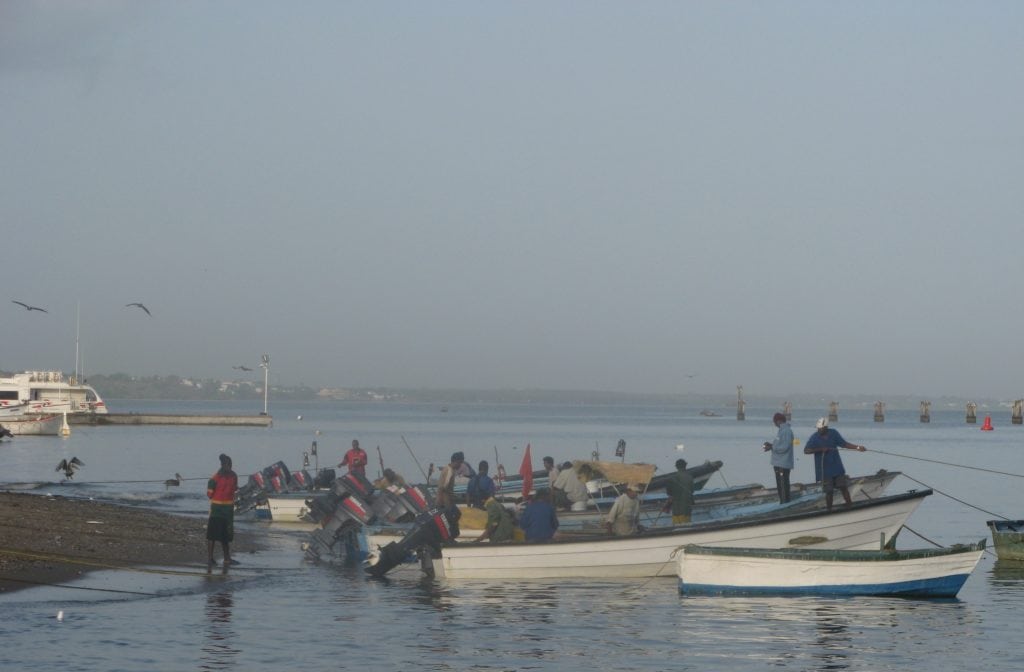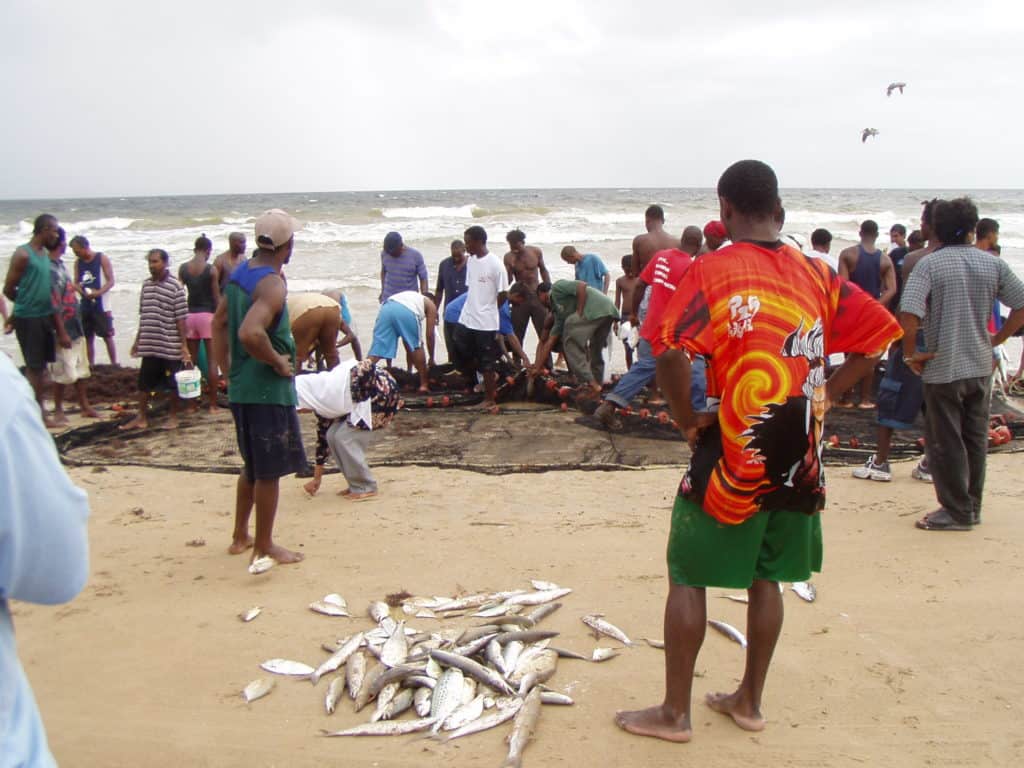“Our small actions can have big impacts, like a ripple effect.” Small-scale fishing and aquaculture can bring food to one family and provides healthy nutrition to millions more. It brings value to all. Small-scale fishers and farmers also know what it means to preserve the balance in our ecosystems. But our livelihoods are at risk, now more than ever, we need to be resilient, include us in decisions that affect us, and we will adapt and innovate with the changing tide. We may be small scale, but our way of life will make a difference, and keep on spreading like ripples in the water”.
These are some of the views expressed by an artisanal female fisher from a video used to help launch the International Year of Artisanal Fisheries and Aquaculture 2022 (IYAFA 2022). This initiative led by the Food and Agriculture Organisation (FAO) along with other collaborating bodies of the United Nations, was inaugurated on November 17 2021 during the same week of 2021 World Fisheries Day. The purpose of IYAFA 2022 is to sensitise citizens and governments on the role and value of artisanal fisheries and aquaculture and the importance of adopting public policies and programs that will allow them to operate in a sustainable manner.
The IMA recognises the important contribution made by the artisanal or small-scale fisheries (SSF). In terms of the number of people involved, food from the sea represents the largest maritime industry. The FAO in a 2020 World Ocean Assessment Report reported that in 2017, 135 million people were involved in fisheries and marine aquaculture with about 90% from fisheries. These two sub-sectors employ fifty-six (56) million persons with women accounting for 13% of this workforce, most of whom were in post-harvesting such as fish processing and retail sales. Their involvement would increase to 50% for this category, if subsistence fishing (fishing for personal or family use) were included.
Importance of artisanal fisheries in TT
Artisanal fisheries is the largest fisheries sub-sector for Trinidad and Tobago and is estimated to produce 75 to 80 per cent of total fish catches. In 2012, total catch landings were 6,657,567kgs or 6657 metric tonnes at a value of $TT131,587,774 (Fisheries Division 2022). This value is mainly for the artisanal fisheries as not all the information is captured for the industrial fleet. Additionally, this value represents ex-vessel value (value of fish sold from the boat) and does reflect final pricing at the top of the value chain. The artisanal fishing fleet catches most of our carite, kingfish, groupers, sharks, lobsters and croakers like cro-cro. Artisanal fisheries are so described based on the level of technology employed and vessel size. In Trinidad and Tobago artisanal vessels are small ranging from 7-10 meters and most of the gears are deployed manually or for some, manually operated winches are engaged. Their fishing areas are mainly coastal and nearshore (few km from shore) when compared to the industrial fleets which fish on the high seas in international waters. In 2019, there were 2,525 vessels (1939 for Trinidad and 586 for Tobago) with an associated 5,050 fishers (3,878 for Trinidad and 1,172 for Tobago) (GORTT 2022). It is estimated that about 40,000 persons in Trinidad and Tobago are supported by the capture and sale of these fisheries resources.

Photo by Rosemarie Kishore
Challenges of artisanal fisheries
In the constant race to provide safe food, promote healthy nutrition for a growing global population and combat hunger in many countries, artisanal fisheries and aquaculture have the unique potential to shape changes in how, by whom, and for whom aquatic foods and products are harvested, processed and distributed (FAO 2021b). Thus, the recognition of sustainable food production from these sub-sectors is crucial.
Despite their considerable potential, artisanal fisheries face many challenges. Core challenges include competition from other fisheries and aquaculture sectors especially from industrial fishing, habit degradation, illegal, unreported and unregulated fishing (IUU) and overfishing. In Trinidad and Tobago, the coastal zone is a multi-use area with tourism, industrial development, housing, conservation efforts, recreational and traditional uses including fishing, predominantly artisanal, all competing for access and often resulting in user conflicts. An IMA study by Kishore et al. (2003), on the impacts of industrialisation on coastal fisheries noted that the relative importance of the industrial sector is a significant factor for prioritising use of the coastal area of Trinidad, which is often to the detriment of the fisheries sector. Over time, loss of fishing areas and fishing days, access to and loss of fish landing sites, industrial discharges including oil spills have negatively affected the artisanal fisheries and the coastal ecosystems whose biological productivity supports these fisheries (Kishore et al. 2003).
On a global scale, artisanal fisheries often face power imbalances in value chains, barriers to trade, and lack the appropriate skills and services to access markets with healthy products at a fair price. Disruptions to supply value chains, reduced markets resulting from the mandatory closure of food services, travel restrictions and associated low hotel occupancy and general restrictive measures albeit necessary, are some of the ways COVID 19 has thrown light onto the deficiencies of the structures and systems upon which artisanal fisheries and aquaculture are dependent. Additionally, to achieve social sustainability, serious redressing is needed to ensure that fishers, fish farmers, fish workers and their communities can obtain proper social services, and resilience is built in communities to deal with ecological and economic shocks. Another core and crosscutting challenge is to ensure gender equality and equity, and the recognition that by empowering women to have the opportunity to earn and control their income, the expected benefits are more likely to support the household’s nutrition, health and education (FAO 2021b).
The importance of the sustainable operations of fisheries is not a new concept and goes as far back as the 1995 Code of Conduct for Responsible Fisheries and much later the Ecosystem Approach to Fisheries Management (EAF). In furtherance to these initiatives, the Global Action Plan (GAP) for IYAFA 2022 envisions:
“A world in which small-scale artisanal fishers, fish farmers and fish workers of both genders are fully recognized and empowered to continue their contributions to poverty alleviation, human well-being and resilient and sustainable food systems through the responsible use of fisheries and aquaculture resources and socio-economic development”.
The expected outcomes of IYAFA 2022 fall into four categories; raised awareness, strengthened science-policy interface, empowered stakeholders and building partnerships, and is supported by seven pillars on environmental sustainability, economic sustainability, social sustainability, governance, gender equality and equity, food security and nutrition and resilience. It seeks to address some of the main challenges described above.
Stakeholder Involvement
A key aspect of the IYAFA Gap 2022 is inclusivity that involves, but is not limited to, national agencies, non-governmental organisations, civil society organisations, private enterprises, development agencies and intergovernmental bodies. For Trinidad and Tobago with respect to artisanal fisheries, many organisations already contribute to the development of the fisheries sector led by the regulatory agencies such as the Fisheries Division, the Tobago House of Assembly, Maritime Services Division, Customs and Excise Division, the Environmental Management Authority (EMA) and the Coast Guard.
Other agencies provide research and capacity building support such as the Caribbean Fisheries Training Institute (CFTDI), Ministry of Labour and Small Enterprise, Ministry of Youth Development and National Services, the Institute of Marine Affairs (IMA), the University of the West Indies (UWI), the University of Trinidad and Tobago (UTT) as well as financial support in the Agricultural Development Bank (ADB). Increasingly, NGOS, such as the well-established CANARI and the newly formed Future Fishers are lending their support to build the capacities of fishing organisations. Within the artisanal fisheries sector many of these fishing organisations and fisheries related interest groups including women, however have been at the periphery of the decision-making process. At the regional launch of IYAFA 2022, CANARI noted their use of mentoring and small grants programs for participatory fisheries governance and sustainable livelihoods will continue to help build the capacity of fishing organisations, of which there are 47 registered in Trinidad and Tobago, as their involvement in fisheries governance is crucial. Rounding out some of the fisheries stakeholders are the involvement of the private sector such as the energy companies who have already made sizeable contribution via their corporate social responsibility programs as well as creating additional funding opportunities. Other funding sources for artisanal fisheries development and conservation efforts include the Green Fund and the United Nation Environment Programme (UNEP) Small Grant Programme.

Photo by Rosemarie Kishore
Way Forward
The ecosystem approach to fisheries management and the initiatives itemised in the IYAFA GAP 2022 provide a roadmap to promote diversification of livelihood options, improve on gender equity, further build resilience especially in light of climate change, and while at the same time promote the sustainability of exploitation of resources and encourage stewardship among the resource users. Several strategies related to the seven pillars of the IYAFA GAP 2022 have been ongoing in Trinidad and Tobago, as the principles of the Ecosystem Approach to Fisheries have been internalised, culminating in the Draft Fisheries Management Bill 2020. However, we need to do more in terms of raising the national awareness of the contributions made by artisanal fisheries and the fishers and really elevate their value, especially now in term of the Blue Economy. It is hoped that at the end of IYAFA 2022, we would produce more concrete achievements and actions.
However, first raising the level of awareness of the artisanal fisheries throughout the country and increasing its political visibility are essential. We need to share information that is more accessible and develop key messages to target broad audiences. National events such as a fisheries exposition and campaigns that include educating the public and the nation’s schoolchildren on its history, evolution and contributions to the economy and society should be on permanent displays such as in our museums. Let us not forget that the artisanal fisheries sector in Trinidad and Tobago is the largest sub sector producing 75 to 80 per cent of our total fish catches. Whatever happens to this sub-sector affects the rest of the fisheries sector, can impact our food security, and therefore should be of concern to all of us.
As a research organisation, the IMA recognises that fisheries governance, which includes the involvement of the fishing industry, the expansion of fisher livelihood options that promote microenterprises and business development, and fisheries research in ensuring the sustainable utilisation of the fisheries resources, are the cornerstones for the development of this sector. The IMA wold like to advocate that IYAFA 2022 be used to build a platform to create greater synergies and partnerships both vertically and horizontally within and outside the fisheries sector. One such achievement could be the development of an agenda for collaborative research within a partnership framework among the stakeholders to support fisheries management in Trinidad and Tobago.
Written by Ms. Rosemarie Kishore, Deputy Director (Ag.) for the Institute of Marine Affairs.





